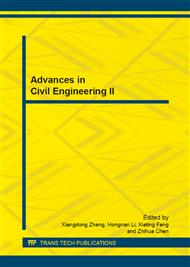p.2844
p.2849
p.2854
p.2863
p.2867
p.2871
p.2877
p.2886
p.2890
Study on the Thermal Cracking Processes of Composite Subjected to Thermal Loading
Abstract:
A numerical method RFPA-T (Thermal Induced Rock Failure Process Analysis) code is used to study the thermal cracking processes of quasi-brittle materials subjected to high or low temperature. The numerical results indicate that thermal stress concentrating along the interface between the matrix and the embedded grains due to their different coefficient of thermal expansion (CTE). The modeling results indicate that θ-crack is generated during temperature increment as the CTE of the embedded grain is smaller than that of the matrix. However, radial-cracks emerged when the temperature decrease. The results obtained from RFPA-T code show a good agreement with experimental evidence of crack patterns caused by thermal expansion mismatch.
Info:
Periodical:
Pages:
2867-2870
Citation:
Online since:
December 2012
Authors:
Price:
Сopyright:
© 2013 Trans Tech Publications Ltd. All Rights Reserved
Share:
Citation:


